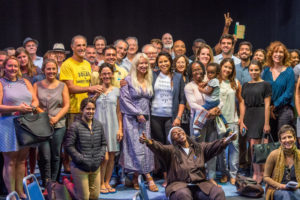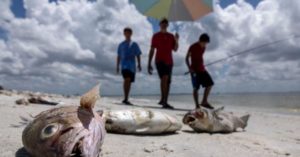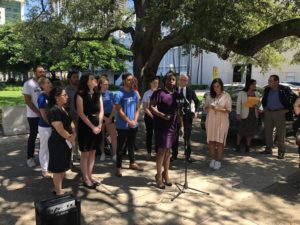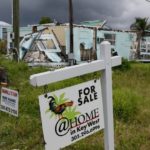By Martha Cecilia Ovadia, Senior Program Associate, Equity & Communications
In advance of TFN’s 2oth Anniversary Conference: Power Forward in Miami, we’ll be sharing interesting and insightful resources that provide context for many of the issues we’ll explore as part of our annual conference, which takes place March 18-20, 2019.
Don’t forget to catch our weekly #MiamiSpotlight and #TFNMiami news on our twitter (Funders_Network) and facebook (Funders’ Network for Smart Growth and Livable Communities) feeds, and check out our TFN 20th Anniversary: Power Forward annual conference page for updates on speakers and sessions.
 From Traffic To Sea-Level Rise, South Florida Has Many ‘Resilience’ Issues. Here’s What That Means (Kate Stein | WLRN | August 3, 2018)
From Traffic To Sea-Level Rise, South Florida Has Many ‘Resilience’ Issues. Here’s What That Means (Kate Stein | WLRN | August 3, 2018)
There’s a buzzword among people who work on quality-of-life issues in South Florida: “Resilience.”
It’s a concept we often apply to a person, someone who’s able to cope with difficult circumstances. But more and more, the word is being used in the context of how communities respond to issues like traffic, hurricanes, affordable housing and rising seas.
At a town hall at WLRN on July 30, people from local government, neighborhoods and non-profits gathered to talk about what “resilience” is and how to build more of it. Read more here.
 Miami-Dade approves ‘rapid-transit’ bus plan over Metrorail expansion in South Dade (Douglas Hanks | Miami Herald | Aug. 30, 2018)
Miami-Dade approves ‘rapid-transit’ bus plan over Metrorail expansion in South Dade (Douglas Hanks | Miami Herald | Aug. 30, 2018)
Miami-Dade’s transportation board approved giving South Dade the county’s first rapid-transit bus system, rejecting demands that elected leaders stick with a 2002 promise to bring a costly Metrorail extension to the region. Read more here.
 How climate change is making ‘red tide’ algal blooms even worse (Angela Fritz | Washington Post | Aug. 5, 2018)
How climate change is making ‘red tide’ algal blooms even worse (Angela Fritz | Washington Post | Aug. 5, 2018)
Red tide is killing Florida’s southwest coast. Fish, manatees, sea turtles — some of them endangered — and nine dolphins have washed up dead on the beaches, and all of them are confirmed or suspected to have been poisoned by the algal bloom. The body of a young whale shark was found on a beach in late July, and biologists believe that it was the first known whale shark to have been killed by red tide.
Now the toxic algae — Karenia brevis — is working up the coast from Sanibel Island to Tampa Bay. Respiratory irritation in humans has been reported as far north as Manatee County, just south of Tampa Bay, where high concentrations of the algae were measured last week. The water off Pinellas County — Clearwater, Largo, St. Petersburg — had elevated concentrations of red tide beyond a normal “background” state for the first time this month. Read more here.
 Florida must prioritize public schools over charter schools, influencers say (Adam Wollner |Miami Herald| Sept. 17)
Florida must prioritize public schools over charter schools, influencers say (Adam Wollner |Miami Herald| Sept. 17)
Charter schools play an important role in Florida’s education system but should not be prioritized over traditional public K-12 schools, according to a panel of the state’s leading voices.
In a new survey of the Florida Influencers, a group of prominent political and policy figures from across the state, a majority (77 percent) said they support a recent Florida Supreme Court decision removing a ballot measure that would have eased the path for creating new charter schools. And a plurality (46 percent) said it was “not important at all” for the next governor and legislature to expand the number charter schools in Florida. Read more here.
 Civil Rights Groups Pressure Miami-Dade County For Early Voting On College Campuses (Jessica Bakeman | WLRN | Sept. 13, 2018)
Civil Rights Groups Pressure Miami-Dade County For Early Voting On College Campuses (Jessica Bakeman | WLRN | Sept. 13, 2018)
Local chapters of the American Civil Liberties Union, the League of Women Voters and several other groups are calling on Miami-Dade County to offer early voting on college campuses here.
The groups argue college students often lack transportation to get to the polls, and many have classes or work obligations on Election Day. So they could be disenfranchised without access to early voting on their campuses. Read more here.
 Hurricane Irma: Unseen by tourists, thread of Keys’ society unraveling (Kimberly Miller | Palm Beach Post | Sept. 8, 2018)
Hurricane Irma: Unseen by tourists, thread of Keys’ society unraveling (Kimberly Miller | Palm Beach Post | Sept. 8, 2018)
A year after Hurricane Irma battered the Florida Keys, the iconic island chain is open for business, beckoning tourists in search of candy-coated sunsets, tropical solace — their lost shaker of salt.
The sandal factories, shell worlds, and key lime stands advertise their colorful kitsch along the Overseas Highway that carries pilgrims to the promised land of sweet libations and Hemingway lore.
But scratch the surface of that coconut-scented veneer and a different side of Hurricane Irma recovery is revealed.
A thread of Keys society — musicians, artists, old-school Conchs and workaday Joes — is unraveling. Read more here.
About the Author
 Martha Cecilia Ovadia is TFN’s senior program associate for equity and communications. Contact her at marci@www.fundersnetwork.org.
Martha Cecilia Ovadia is TFN’s senior program associate for equity and communications. Contact her at marci@www.fundersnetwork.org.
